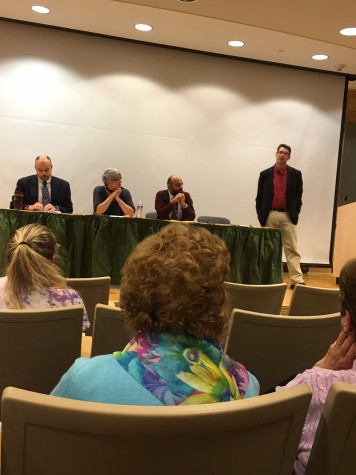
By MIKE MORRIS
THE PICKET – Faculty from Shepherd University’s political science department addressed issues such as the recent Supreme Court vacancy, Texas Sen. Ted Cruz’s eligibility to be president, and the continued electoral success of businessman Donald Trump in a teach-in held at the Robert C. Byrd Center for Legislative Studies on Wednesday.
The panelists were Dr. Stephanie Slocum-Schaffer, Dr. Max Guirguis, and Dr. Joseph Robbins, all professors of political science.
The faculty spoke to a mostly full house made up of students and community.
Gurguis opened with remarks on Cruz and his questioned status as a natural-born citizen. Guirguis explained that the controversy centers around Cruz’s birth in Canada to an American mother and a Cuban-Canadian father. The Constitution mandates that the president be a natural-born citizen, but does not specify what the term means or who qualifies. Cruz is not the first person to make a bid for the presidency amid this type of controversy, Guirguis pointed out. Barry Goldwater, George Romney, and John McCain, all Republicans born in the Arizona Territory pre-statehood, Mexico, and the Panama Canal Zone, respectively, have run for president in the past.
Guirguis outlined the two schools of thought on Cruz’s status as a natural-born citizen. Supporters of Cruz’s natural-born citizenship contend that under British law in colonial times, children born to British subjects outside the British Empire were considered naturally born British citizens, and this influenced the founding fathers when they put the natural-born specification in the Constitution. Secondly, the first Congress, of which many of the framers of the Constitution were members, passed the Naturalization Act of 1790, giving children born abroad to American citizens natural-born citizen status.
Opponents of Cruz’s eligibility, Guirguis said, cite the revision of the Naturalization Act and the fact that the phrase “natural-born” does not appear in subsequent versions of the Act. They allege Cruz, being born in Canada, may have received American citizenship at birth from his American mother, but did not get his citizenship by birth through physical presence in the United States.
Slocum-Schaffer spoke about the vacancy on the Supreme Court left by the death of Justice Antonin Scalia. She said the average tenure of a Supreme Court justice is 26 years, making a president’s choice in nominee important. She also noted the ideological split of the court in recent years and the prevalence of 5-4 decisions, where the court’s four liberals and four conservatives voted with each other, leaving the one swing vote to decide the case. The eight-member court is left to rule on cases such as an attempt to limit access to abortions in Texas through regulations of clinics.
Republican leadership in the Senate has said it will not take any action to confirm any nominee President Obama may propose in the final year of his term, leaving an eight-member court until he leaves office in January 2017. With an eight-member court, the ruling of the lower court, the ruling that was appealed and sent to the Supreme Court, is left in place if the court issues a 4-4 ruling.
Slocum-Schaffer said the Supreme Court vacancy has major implications for the 2016 election and beyond. Though the Supreme Court is made up of justices appointed by the president, she asserted that Scalia’s replacement will essentially be popularly elected by the American people electing the president who will nominate a replacement and one-third of the Senators confirming him or her. She was not enthusiastic about the democratization of the Supreme Court, saying their role is to decide cases based on what the Constitution says, not what may be politically convenient at the time.
“We already have two political branches, I’m not sure if having a third political branch is a good idea,” Guirguis said in response to a question from the audience. “Constitutional interpretation should not be a function of popular vote or prevailing opinion. Where would the little guy go for justice if all three branches moved in the direction [that] the political winds are blowing?”
Robbins highlighted the similarities between this election cycle and the 1912 race, which also saw a socialist, a Democrat, a Republican, and a populist vying for the presidency.
Robbins said that the candidates in the current election cycle represent a strong repudiation of the establishment in both parties, reflecting the fact that many Americans are fed up with business as usual in politics, citing the fact that someone like democratic socialist Bernie Sanders is still campaigning and putting up numbers that, while not a direct challenge to Clinton, have outperformed the expectations of many, including a win in Michigan on Tuesday. The Republicans have also seen their establishment candidate falter, with Marco Rubio only winning Minnesota and Puerto Rico out of the primaries that have been held so far, despite the endorsements of many well-respected Republican donors. Rubio was hit with another blow on Tuesday, as Trump won three more states, prevailing in Hawaii, Michigan, and Mississippi.
Robbins compared Donald Trump to Theodore Roosevelt, who played the role of the populist in the 1912 election, poking and prodding the Republican Party to the delight of his supporters, calling William Howard Taft, the Republican nominee, “fathead” and comparing his intelligence to that of a guinea pig, much as Trump has played on insinuations and jabs at other candidates to his benefit.
Finally, he noted how unusual it is that Trump is the leading GOP candidate, when he has professed to be spiritual rather than religious and has not taken hardline conservative stances against abortion and tax increases, but proposed that voters may not care about his lack of conservative bona fides due to increased hunger for a more authoritarian leader. Trump’s promise to build a wall on the southern border and make Mexico pay for it, or his espoused support for waterboarding as a method of interrogation, Robbins said, plays well with voters who are concerned with the way the country is headed and yearn for a strong leader.
